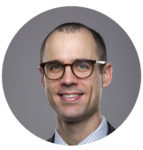WANT TO BE A NEW CHAPTER ALUMNI?
Apply online to share your accomplishments and endeavors.
APPLY TO BE FEATUREDOctober 2018

Scottsdale, Arizona
Division of Clinical Dermatology, Department of Dermatology, Mayo Clinic
Assistant professor of dermatology
VIEW PROFILEAaron Mangold, M.D. (TY ’12, DERM ’15), has come a long way from Wallace Township, Illinois, population 491. After pole vaulting his way through four years of high school and college, he launched himself into a medical and research career that has garnered multiple Mayo Clinic and industry grants, a Career Development Award from the Dermatology Foundation, and a Patient Hero Award from the American Society of Dermatologic Surgery. The latter recognized his public education and lobbying efforts to lift the ban on children carrying and applying sunscreen in schools, camps and other government-operated facilities. His future’s so bright, he’s gotta wear shades. Or rather, he chooses to wear shades as part of his skin cancer prevention practices.
I grew up in Wallace Township, Illinois, a small farming community of 491 people. I grew up on a farm, but my parents weren’t farmers. They thought it was a good place to raise kids. My father is a psychologist, and my mother ran a nonprofit for adults with disabilities.
At Washington University in St. Louis, Missouri, I pole vaulted all four years. It takes a toll on the body. I content myself with distance running nowadays.
There was no lightbulb moment. Rather, it was an assimilation of my experiences. In college I worked in research labs and thought I might pursue a Ph.D. in chemistry or possibly a medical career. Trial and experience led me to medicine. I still enjoy research very much. Having a medical degree allows you to conduct research and have patient interaction.
Dermatology brought together different areas I liked — clinical medicine, laboratory medicine and pathology, and rare diseases. I interviewed for internal medicine and dermatology. My niche is dermato-oncology and complex medical dermatology
I focus on dermato-oncology complex medical dermatology. I co-direct a multidisciplinary cutaneous T-cell lymphoma clinic. Most of my research focuses on cancer genomics and inflammatory diseases and how they evolve. I study whether we can modulate pathways using targeted therapies and how to simplify the approach to cancer staging.
I’ve been lucky to have good internal support and from foundations to enable my research. You can’t be at the cutting-edge of practice without doing research.
From a clinical standpoint, I’m proud to have completed residency at Mayo Clinic. That shows you’re certified by a group that’s the premiere in health care. From a research standpoint, I’m proud of the initial Career Development Award I received during residency. The Dermatology Foundation has only given 30 to 40 awards. I got it because of the environment of support in which I trained. Well-respected people in the field thought it was worthwhile to invest in my career.
I’m also proud of and humbled by the award for my advocacy work. I received the Patient Safety Hero Award from the American Society of Dermatologic Surgery in 2017 for my work on sunscreen legislation.
It’s eye-opening as you transition from student to educator and mentor, with people coming to you to ask questions. It’s a fun responsibility but interesting transition. You start to see the others in the institution and around the world as peers. Fortunately, at Mayo we have great collaboration among physicians on difficult cases.
My wife and I have a new baby boy, so most of my time centers on seeing him. I enjoy distance running, swimming, mountain biking, rocking climbing and traveling to do those activities.
It’s difficult. I try to set limits on my time because people will always want one more thing from you. When you have a child or other major life change, you have an opportunity to reassess where you want to go and make any necessary adjustments. I feel like I’m in a perpetual state of self-reflection of how to create a sustainable existence as a physician.
I’m at a point where I need to solidify myself as a late-early career investigator and find transitional funding. I also want our lymphoma clinic to continue to grow, and to continue novel drug trials. I want to integrate translational research into daily practice and use technologies to advance patient care.
See past New Chapter stories here.
Apply online to share your accomplishments and endeavors.
APPLY TO BE FEATURED